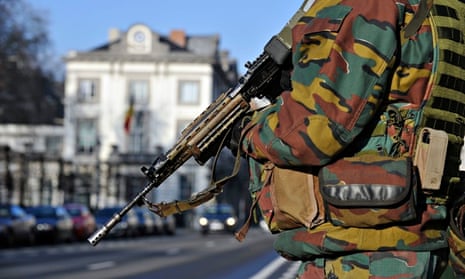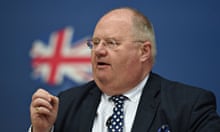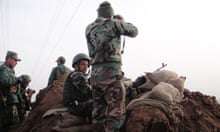A hardcore of British women who have travelled to Syria to join Islamic State (Isis) are encouraging other women in the UK to carry out terrorist attacks back home, the Observer has learned.
The role of British female jihadists in inciting terrorism in the UK has been uncovered by the International Centre for the Study of Radicalisation (ICSR) at King’s College London, which has identified a group of around 30 female Britons based in northern Syria.
According to monitoring of their social media accounts, a number have been acting as Isis recruiters or openly praising the Charlie Hebdo shootings, while encouraging more bloodshed, including the beheadings of westerners.
Until now, the western women joining Isis have largely been portrayed as passive – travelling to marry jihadists and bear their children away from the frontline. But as police across the UK prepare for possible attacks against them and with Europe on high alert following arrests of suspected Islamist militants in Belgium, France and Germany, the ICSR work shows that many such women are part of the escalating threat.
Melanie Smith, research fellow at the ICSR and the person in charge of the first known database of female foreign fighters, said: “British women tend to incite [attacks], they say to people that can’t move to the Islamic State: ‘Why not carry out something at home?’ That’s a common message: if you can’t leave your family behind or afford to move to Syria then carry out something.”
Information from the database, which has details of 70 women, the youngest a French 15-year-old, suggests the portrayal of women as merely providing support and children for male fighters is becoming increasingly outdated.
Smith said: “I don’t think anyone talks about women returning as a risk. While they might not have the same military training, you can see women online being frustrated about the fact they can’t fight and they suggest to each other that they could do something else. Women historically have been used in suicide bombings and singular operations.”
The ICSR, which is run by Professor Peter Neumann, observed a spike in social media activity following the Paris shootings, with researchers identifying a significant number of UK women praising the attacks in Paris. Among them was a 16-year-old from Manchester who celebrated the shootings on Twitter, while another British woman greeted the Charlie Hebdo shootings by saying: “May Allah help them kill as many kafirs they can #parisshooting.”
Another potential name to be added to the ICSR database is Hayat Boumeddiene, partner of one of the Paris attackers, Amédy Coulibaly, and France’s most wanted woman.
David Cameron, who is in Washington on a two-day trip, told the CBS political show Face the Nation that Britain now faced a “very severe threat”, adding that an attack was “highly likely”. While the prime minister insisted he and President Barack Obama had made significant progress in talks on how to counter international terrorism, he acknowledged that it would be a long struggle.
“I think the reason some people are concerned about this strategy is that perhaps we haven’t said enough about how long it is going to take to work,” he said. He conceded that “it is going to take a very long time to deal with this”, because the answer lay in having strong governments and security forces in Iraq and Syria.
The UK government and US secretary of state John Kerry will welcome foreign ministers from around 20 countries to Lancaster House in London on Thursday for a day of talks on how to combat the threat of Isis. Discussions will focus on the military campaign, Isis’s financing, foreign fighters, strategic communications and humanitarian assistance.
But as Cameron stressed the importance of the UK’s “special relationship” with the US, diplomats and pro-EU politicians expressed concern that the UK was in danger of isolating itself from the EU at the very time when European nations needed to work together.
Lord Hannay, the former UK ambassador to the EU and the UN, who chaired a House of Lords committee on the UK’s involvement in EU justice and home affairs issues, said that the UK would be “out in the cold” in terms of European cooperation in the fight against terrorism if it had not opted back in to EU measures such as the European arrest warrant – or if it were to leave the EU after the referendum promised by Cameron in 2015.
The crossbench peer, who now advises the cross-party group British Influence, which campaigns to keep the UK inside a reformed EU, said that if Eurosceptics had got their way last year, pulling the UK out of most EU police and justice cooperation, it would have left the country more exposed. “Just think where we would be today, in the midst of a major threat to European democracies if we had not opted back in on 1 December … We would be out in the cold and more at risk. Absolutely.”
In Greece anti-terror police were interrogating four suspected jihadis, including the alleged mastermind of the cell that was dismantled in Belgium on Thursday, following their arrest in Athens.
Officials were also examining logs of their mobile phones found in their city centre apartment. Greek security forces have long expressed fears of jihadis infiltrating the country. Earlier on Saturday, Belgian state broadcasters said authorities were seeking a Brussels man of Moroccan origin who was hiding in Greece.










